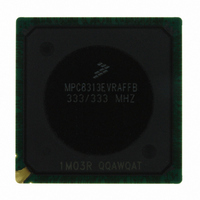MPC8313EVRAFFB Freescale Semiconductor, MPC8313EVRAFFB Datasheet - Page 6

MPC8313EVRAFFB
Manufacturer Part Number
MPC8313EVRAFFB
Description
IC MPU POWERQUICC II PRO 516PBGA
Manufacturer
Freescale Semiconductor
Datasheet
1.MPC8313CZQAFFB.pdf
(100 pages)
Specifications of MPC8313EVRAFFB
Processor Type
MPC83xx PowerQUICC II Pro 32-Bit
Speed
333MHz
Voltage
0.95 V ~ 1.05 V
Mounting Type
Surface Mount
Package / Case
516-PBGA
Processor Series
MPC8xxx
Core
e300
Data Bus Width
32 bit
Development Tools By Supplier
MPC8313E-RDB
Maximum Clock Frequency
400 MHz
Operating Supply Voltage
- 0.3 V to + 1.26 V
Maximum Operating Temperature
+ 105 C
Mounting Style
SMD/SMT
Data Ram Size
16 KB
I/o Voltage
2.5 V
Interface Type
I2C, SPI, UART
Minimum Operating Temperature
- 40 C
Program Memory Type
EEPROM/Flash
For Use With
MPC8313E-RDB - BOARD PROCESSOR
Lead Free Status / RoHS Status
Lead free / RoHS Compliant
Features
-
Lead Free Status / Rohs Status
Lead free / RoHS Compliant
Available stocks
Company
Part Number
Manufacturer
Quantity
Price
Company:
Part Number:
MPC8313EVRAFFB
Manufacturer:
FREESCAL
Quantity:
150
Company:
Part Number:
MPC8313EVRAFFB
Manufacturer:
Freescale Semiconductor
Quantity:
10 000
Electrical Characteristics
1.10
The serial peripheral interface (SPI) allows the MPC8313E to exchange data between other PowerQUICC
family chips, Ethernet PHYs for configuration, and peripheral devices such as EEPROMs, real-time
clocks, A/D converters, and ISDN devices.
The SPI is a full-duplex, synchronous, character-oriented channel that supports a four-wire interface
(receive, transmit, clock, and slave select). The SPI block consists of transmitter and receiver sections, an
independent baud-rate generator, and a control unit.
1.11
The MPC8313E provides an integrated four-channel DMA controller with the following features:
There are two I
devices for expansion and system development.
The DUART supports full-duplex operation and is compatible with the PC16450 and PC16550
programming models. The 16-byte FIFOs are supported for both the transmitter and the receiver.
The MPC8313E local bus controller (LBC) port allows connections with a wide variety of external DSPs
and ASICs. Three separate state machines share the same external pins and can be programmed separately
to access different types of devices. The general-purpose chip select machine (GPCM) controls accesses
to asynchronous devices using a simple handshake protocol. The three user programmable machines
(UPMs) can be programmed to interface to synchronous devices or custom ASIC interfaces. Each chip
select can be configured so that the associated chip interface can be controlled by the GPCM or UPM
controller. The FCM provides a glueless interface to parallel-bus NAND Flash E2PROM devices. The
FCM contains three basic configuration register groups—BRn, ORn, and FMR. Both may exist in the
same system. The local bus can operate at up to 66 MHz.
The MPC8313E system timers include the following features: periodic interrupt timer, real time clock,
software watchdog timer, and two general-purpose timer blocks.
2
This section provides the AC and DC electrical specifications and thermal characteristics for the
MPC8313E. The MPC8313E is currently targeted to these specifications. Some of these specifications are
independent of the I/O cell, but are included for a more complete reference. These are not purely I/O buffer
design specifications.
6
•
•
Allows chaining (both extended and direct) through local memory-mapped chain descriptors
(accessible by local masters)
Supports misaligned transfers
Electrical Characteristics
DMA Controller, Dual I
Serial Peripheral Interface (SPI)
Timers
2
C controllers. These synchronous, multi-master buses can be connected to additional
MPC8313E PowerQUICC
™
2
II Pro Processor Hardware Specifications, Rev. 3
C, DUART, Local Bus Controller, and
Freescale Semiconductor













